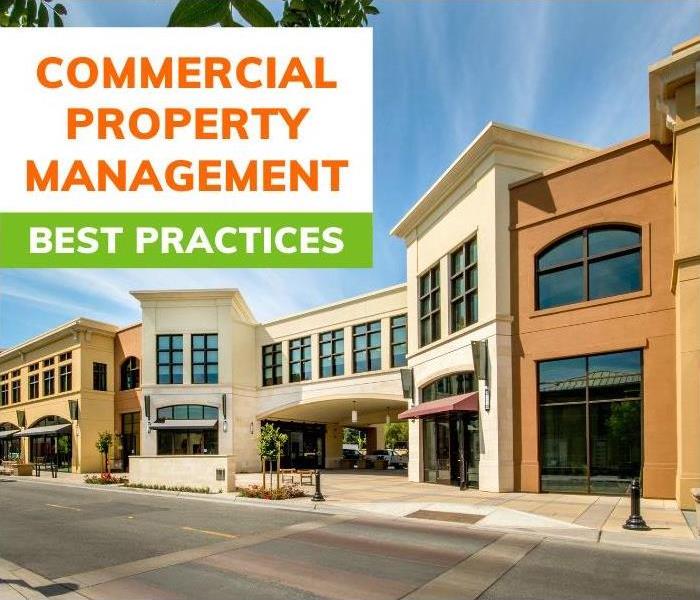Commercial Property Management Best Practices
3/12/2024 (Permalink)
Commercial Property Management Best Practices
Commercial property management plays an important role in the economy. While business owners need places to run their companies, property management professionals are hard at work to keep things running smoothly in the background.
Whether you manage traditional office buildings, retail complexes, coworking spaces, or other commercial property forms, a lot of work goes into ensuring tenant satisfaction and a safe environment for all. You have to keep up with the management of the actual property. Still, at the same time, you need to put your interpersonal skills to work when navigating different personalities and industries.
If you’re looking for ways to make your life easier as a commercial property manager, below are some commercial property management best practices that can help you work more effectively and efficiently:
Review Your Standard Lease Agreements Annually
When you first got into property management, you probably spent much time drafting your standard lease agreement or agreements. You probably considered the needs of potential tenants and thought about the long-term implications of each item included in your lease documents.
Although these documents have served you well, now is a good time to review your lease agreements to see if any changes can make it easier to do your job. This is particularly true if you’ve had the same agreements in place for years and haven’t made any changes.
Economic factors, changes in workplace trends, and more can all impact property management over time, and your lease agreements and commercial property management best practices must keep up with the times to be effective.
Now would be a good time to review your standard lease agreement documents to review items and update policies. Make sure you have your attorney review your final drafts to give their seal of approval.
Handle Work Orders in a Timely Fashion
Repair requests and other work orders should always be handled promptly. Effective commercial property managers have systems to ensure this happens, and many today use property management software and even artificial intelligence to keep things in order.
Whether you need to contract with a water restoration company, a general contractor, or another contracting professional, your work order processing system should be as efficient as possible. Commercial property management best practices dictate that work orders and repair requests get addressed quickly to improve tenant satisfaction, but this can also be a legal issue.
If you don’t address commercial property maintenance and repair concerns brought up by tenants, your property management company may be the target of a lawsuit if someone becomes injured. Failure to efficiently address work orders may also cause existing problems to get worse over time, leading to higher costs and more problems.
Have a Schedule for Inspections and Maintenance
With all you do daily as a commercial property manager, it can be easy to let inspections slip by the wayside. After all, if no one is reporting a problem, everything is fine, right?
Unfortunately, you may discover expensive problems brewing without an inspection schedule. Routine preventative maintenance and inspections allow you and your team to get ahead of normal wear and tear before issues like malfunctioning light fixtures or smoke detectors turn into major repairs.
Regular inspections as part of a property maintenance plan can also ensure energy efficiency, especially if you manage older office spaces or retail spaces that haven’t been updated. Older, inefficient fixtures can lead to higher energy costs, and you may be on the hook for these higher costs depending on your lease agreement. Over time, high energy costs due to inefficient fixtures, wiring, pipes, and routing can eat into rental income and make predicting and controlling costs more difficult.
Make Communication a Priority
The most important best practice in commercial property management is to communicate often. Communication is vital between your team and tenants and between your team and vendors, contractors, and other service professionals with whom you work. A communication breakdown often delays responding to work orders, and poor communication can also earn your property management company a bad reputation in the community.
To make communication easier, think about all of the methods of communication at your disposal. Consider talking with tenants to survey them on their preferred methods of communication as well. Email, phone calls, text messages, and standard mail all have their place when it comes to effective communication in property management. Make sure you use the right method for the right purpose to keep everyone up to date on repairs, maintenance, inspections, and expectations.
Involve Your Team
Lastly, involve your entire commercial property management team in decisions. This doesn’t mean you need to allow everyone to make big decisions, but you should keep your entire team in the loop and ask for feedback often.
Every member of your team, from your office staff who work face-to-face with tenants to your contractors who complete repairs and process work orders, should be knowledgeable and passionate. They need to have a vested interest in ensuring tenant satisfaction.
When you communicate clearly with your team, they can provide this same level of communication to your tenants. In turn, you experience greater efficiency in handling tenant concerns and questions, resulting in a more efficient workflow.
Contact SERVPRO of Arcadia for Professional Water Damage Restoration Solutions
If you manage commercial properties, SERVPRO of Arcadia is here to make your life easier. We specialize in water damage restoration and other solutions for commercial property management.






 24/7 Emergency Service
24/7 Emergency Service
